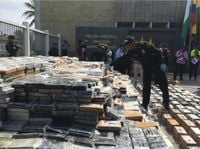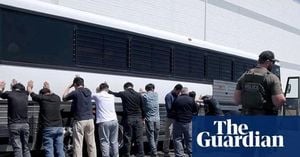Carlos Lehder, a notorious figure from the Medellin Cartel, was arrested on March 28, 2025, at El Dorado International Airport in Bogotá, Colombia, as he returned from Germany. This arrest has reopened a dark chapter in Colombia's history, as Lehder was a key associate of the infamous Pablo Escobar.
At 75 years old, Lehder, known by his alias "El Loco," was taken into custody by Colombian immigration authorities due to an outstanding arrest warrant related to a conviction for manufacturing and carrying weapons. This warrant dates back to 1995 and carries a 24-year prison sentence, which has now come back to haunt him after he attempted to enter Colombia as a tourist.
Lehder's criminal career began when he was just 20 years old as a car thief in the United States. He later transitioned to drug trafficking, where he gained notoriety for establishing a cocaine trafficking route to the U.S. through the Bahamas. His operations were pivotal in the expansion of the cocaine trade during the 1970s and 1980s.
After being captured in 1987, Lehder was the first Colombian drug trafficker extradited to the U.S., where he served 34 years in prison for drug trafficking. His sentence was reduced due to his cooperation with U.S. authorities in the early 1990s, and he was eventually released in 2020, moving to Germany, where he had familial ties.
Upon his return to Colombia, Lehder's legal troubles resurfaced swiftly. His attorney, Sondra Macollins, argued that the arrest was arbitrary, claiming that the arrest warrant had expired. She stated, "He has already paid his debt to society, and resocialization has been granted to him." However, legal experts suggest that Lehder may still have to face the consequences of his past actions.
On March 29, 2025, a judge confirmed the legality of Lehder's arrest and ordered pre-trial detention. He is set to appear before the Court 18 of Execution of Penalties on March 31, where his legal status will be clarified. The court must determine if the arrest warrant is still valid or if it has lapsed due to the passage of time since it was issued.
Lehder's return to Colombia has stirred memories of the violent era of the Medellin Cartel, which was responsible for numerous assassinations and bombings in the country. While he has distanced himself from the violent tactics employed by Escobar, his legacy is still intertwined with the bloodshed that characterized that time.
In his recent book, "Life and Death of the Medellin Cartel," Lehder detailed his experiences and the inner workings of the cartel, including its financing of the infamous Palace of Justice siege. He hopes that by sharing his story, he can provide cautionary insights to others who might be drawn to the narcotics trade.
As Lehder awaits his court appearance, the Colombian government faces the challenge of reconciling its past with its present. The current administration, led by President Gustavo Petro, is working to negotiate peace with various armed groups, including remnants of the paramilitary forces that have emerged from the shadows of the drug trade.
Lehder's case is emblematic of the lingering issues surrounding drug trafficking in Colombia. Despite the fall of the Medellin Cartel, the narcotics trade has evolved, with new players and methods emerging. The Clan del Golfo, a powerful criminal organization, has taken on a dominant role in the drug trade, complicating efforts for peace and stability in the region.
As the judicial process unfolds, many Colombians are left to ponder the implications of Lehder's return. Will he face justice for his past crimes, or will the complexities of his legal situation allow him to evade the consequences of his actions? The coming days will be critical in determining not only Lehder's fate but also the broader narrative of Colombia's ongoing battle with drug-related violence.
In the meantime, Lehder's story serves as a stark reminder of the dark legacy of the Medellin Cartel and the ongoing challenges faced by Colombia in addressing the issues of drug trafficking and organized crime. As the country continues to grapple with its tumultuous past, the question remains: how can Colombia move forward while still confronting the ghosts of its history?







